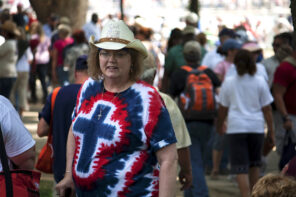Popularity in public figureheads is fleeting. As the newly-elected president enters office with the lowest approval ratings of an incoming president in 40 years and contentious elections prepare to begin throughout Europe, the question of what popularity means today among leaders is debatable. For religious leaders, it’s even more debatable.
Even as Vatican battles over his leadership continue to unfold, Pope Francis is more popular than ever in America. Pew Research Center’s latest analysis reveals that seven in ten Americans hold a favorable view of him, while 11% have no opinion.
Where these numbers begin to get interesting is in religious breakdown. American Catholics appear to be very fond of the pope, with 87% expressing a favorable view of him, but among white evangelicals his ratings are not so high—only 53% favor the pope, whereas white protestants see him positively at a rate of 72%. This may mirror the more conservative stance of many evangelicals versus the more progressive one of many mainline protestant denominations, but it’s also a reminder of America’s history of anti-Catholicism.
Fear of Catholics was so rampant that nativists in the 1800s regularly spread rumors that Catholic immigrants were going to install the pope as America’s leader in a coup, and in 1844 Catholic churches were burned and Catholics hunted down by mobs. Protestant army officers abused Irish Catholic soldiers so badly some defected to the Mexican side during the 1846 war (they were subsequently hanged), and the KKK unleashed verbal attacks on Catholics in the 20th century.
Today, public suspicion of Catholics is less overt, but still present, and sometimes that takes the form of attacks on the pope. In addition, the current pope’s reluctance to identify too closely with culture warriors on the right has brought even more criticism making it more difficult to identify the roots of the pope’s critics. Brietbart bemoaned Francis’ failure to “fight against Godless immorality” when he spoke to congress in 2015. Late last year, Breitbart criticized his picks for American cardinals, saying he’d effectively “snubbed” conservatives. As Patti Miller noted here at RD, Breitbart’s former editor Steve Bannon, newly installed as Trump’s chief strategist, is a Catholic, but a member of the self-described “church militant” wing of Catholicism. Church Militant’s Michael Voris has described the pope as a “disgrace to the chair of Peter” and the leader of a “pack of wolves.”
Francis is also clearly unpopular with many Catholic public intellectuals and columnists, including Ross Douthat, Matthew Schmitz of First Things, and Michael Brendan Dougherty of The Week. But their arguments that the pope is “cowardly,” “condescending” and possibly heretical appear to be falling on deaf ears. Whether the pope is conservative or liberal is up for debate, but what he is in America is popular—more popular by a wide margin than his predecessor Pope Benedict, often held up by these same writers as representative of a more authentic Catholicism.
The fact that the pope is so popular among America’s least religious, the so-called “nones,” may be the most interesting finding of all. Pew says that when the pope was elected, nones viewed him with approval at a rate of 39% (that number may require some parsing since a third of nones had no opinion of Francis in 2013); today that figure is as high as 71%. But why do nones like Pope Francis so much? Many of them choose not to belong to a single religious tradition, yet only one in five of them dislike religion.
Many nones say that social justice, care for the marginalized, and the preferential option for the poor—basics of Catholic teaching that the pope has emphasized throughout his papacy—are what makes religion valuable in society. And after an ugly election cycle in which the most vulnerable in society were often the subject of protracted attack, an alternative voice that stands in solidarity with Muslims and immigrants may indeed sound very appealing right now. When we consider the alternative, it’s easy to see why.





